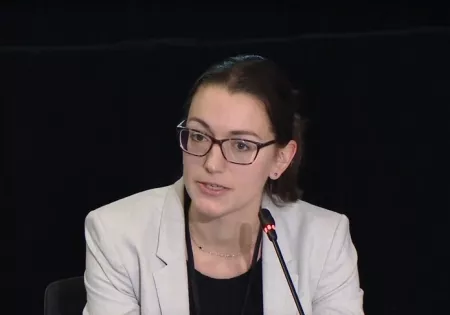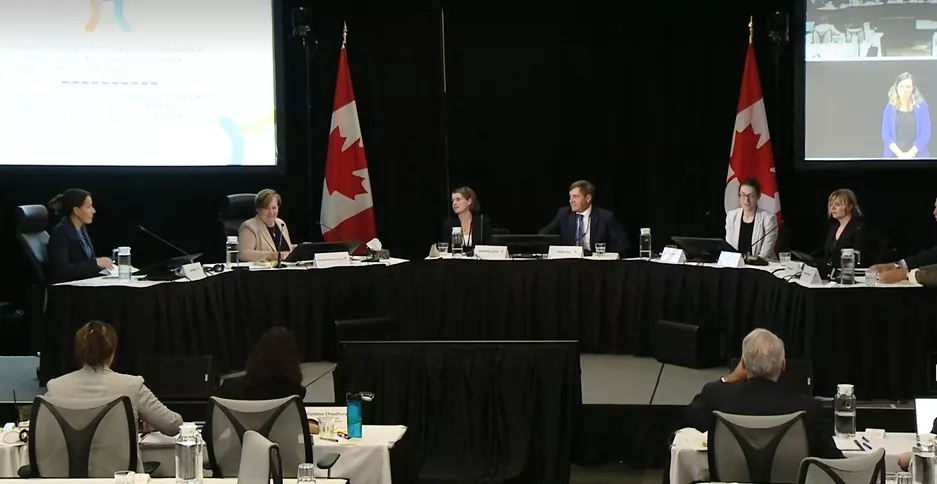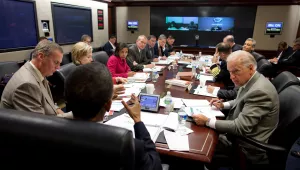
On October 23, 2024, the Belfer Center’s Maria Robson-Morrow testified as part of an expert panel contributing to the Government of Canada’s Public Inquiry into Foreign Interference in Federal Electoral Processes and Democratic Institutions.
The Foreign Interference Commission, which is conducting the inquiry, was established on September 7, 2023, following widespread concerns of foreign interference into Canadian democratic processes. The Commission released an initial report on May 3, 2024 that found that foreign interference by the People’s Republic of China had undermined public confidence in Canada’s democracy, that there had been efforts to influence outcomes in the 2019 federal election—bolstering certain candidates while undermining those seen as unfriendly to the PRC—and also that diaspora groups, including students, had been particularly targeted by foreign interference efforts.
The inquiry was prompted by a serious of leaks that revealed not just widespread foreign efforts to target individuals on Canadian soil, influence Canadian electoral outcomes, and to target specific Parliamentarians, their staff, and their families, but also immense gaps in how the national security and intelligence community, particularly the Canadian Security Intelligence Service (CSIS), tracked and responded to these threats.
The highest-profile incident came in May 2023, when the Globe and Mail revealed that a classified 2021 CSIS report indicated that a Canadian Member of Parliament and his family were being targeted; however, the parliamentarian himself was not informed that he was a target. (He only received a general defensive briefing.) The parliamentarian was later revealed to be Michael Chong, who had been a vocal critic of PRC policies towards the Uighur population in China. When approached by the Globe and Mail regarding CSIS tracking a known threat against him, Chong responded that he had no knowledge of it. The fact that a Member of Parliament could not be briefed on the specifics of a direct threat towards him and his family led to widespread calls by a former National Security Adviser and others to reform Canada’s national security and intelligence apparatus.
A further high-profile incident emerged in September 2023 when Canadian Prime Minister Justin Trudeau revealed that intelligence indicated the Government of India was behind the June 2023 assassination of a Sikh separatist, Hardeep Singh Nijjar, on Canadian soil. In 2024, a Canadian parliamentary committee identified India as the “second-most significant foreign interference threat to Canada’s democratic institutions and processes.”
What is foreign interference?
In a pithily-named 2022 document entitled “Foreign Interference and You,” the Canadian Security Intelligence Service (CSIS) defines foreign interference as “deliberate and covert activity undertaken by a foreign state to advance its interests, often to the detriment of Canada’s.” Importantly, this activity must go beyond lobbying or diplomacy; it must be “covert, malign, and deceptive.” The overall goal, in CSIS’s assessment, is to give the adversary an advantage that could be political, military, or economic.
The U.S., meanwhile, through the Office of the Director of National Intelligence’s Foreign Malign Influence Center, defines foreign interference as “a type of foreign influence that includes one of, or a combination of, the following characteristics: subversive—intends to undermine the United States, its institutions, political systems, or the will of the American people; undeclared—intends to hide a foreign country’s hand; coercive—pressures individuals or groups in the United States to make decisions or support policies that favor a foreign country; and criminal—violates U.S. law.”
Similarly, Australia’s Counter Foreign Interference Coordination Center states that “foreign interference is activity that is: carried out by, or on behalf of, a foreign power; which is coercive, deceptive, clandestine or corrupting; and is contrary to Australia’s sovereignty, values and national interests.” Its Department of Home Affairs further states that foreign interference is “hidden, dishonest, threatening or corrupting and intended to influence an individual’s political rights or undermine Australia’s national interests.”
All definitions go alongside concerns over foreign espionage; while espionage does not appear in the definition of foreign interference itself, Australia explicitly notes that foreign interference may take place in conjunction with espionage.
Tackling Foreign Interference Challenges
Foreign interference is a national security priority for Canada, the U.S., and their “Five Eyes” intelligence partners (Australia, the United Kingdom, and New Zealand). The precise definitions vary, as do the policy and security structures for addressing the threat. And no one has all the answers; the foreign interference challenge has rapidly risen in prominence within the intelligence communities and also in public awareness, and the institutional structures established to deal with it are extremely young and rapidly evolving.
In the U.S., the Foreign Malign Influence Center, which was activated in 2022, has a mission of identifying and mitigating attempted foreign interference by state and non-state actors, and pursues this mission through external engagement and public notifications.
In Australia, the Counter Foreign Interference Coordination Center, established in 2018, supports the National Counter Foreign Interference Coordinator and takes a “whole of government approach” and has engaged in several related initiatives, including establishing a University Foreign Interference Taskforce to bolster academic resilience to foreign interference.
Canada’s national security apparatus is evolving in response to these challenges. While Canada has established a National Counter Foreign Interference Coordinator similar to the Australian model, it does not currently have a center or similar institution dedicated to combatting the threat. However, recent incidents have prompted new legislation and evolving authorities for the intelligence services. In May 2023, the Minister of Public Safety issued the “Ministerial Direction on Threats to the Security of Canada Directed at Parliament and Parliamentarians,” which requires CSIS to “ensure that parliamentarians are informed of threats to the security of Canada directed at them,” and authorizes direct disclosures. In June 2024, Royal Assent was granted to new legislation: Bill C-70, “An Act respecting countering foreign interference.” The Act updated Canada’s Security of Information Act, Criminal Code, Canada Evidence Act, and the CSIS Act, as well as creating a foreign agent registry. The recent changes allow CSIS to engage more directly with victims and external partners and gives the service more collection powers in countering foreign interference and bolstering national security.
Commission Testimony
Commissions on security and intelligence issues, while rare in Canada’s history, have prompted major institutional change—notably the creation of the Canadian Security Intelligence Service in 1984. The current Commission, led by Commissioner Marie-Josée Hogue, a judge of the Quebec Court of Appeal, was established in September 2023 and has conducted its activities in two phases. In the first phase, it investigated potential foreign interference in the 2019 and 2021 federal elections and held public hearings, before producing an initial report in May 2024. In the second phase, the Commission held further hearings with key witnesses, including government officials and members of civil society and diaspora groups, and then engaged in Policy Consultations from October 21-24, 2024.
As part of the Policy Consultation process, the Belfer Center’s Maria Robson-Morrow testified on a panel on October 23, 2024, entitled “Canada’s National Security Apparatus.” The panel was asked questions such as:

- Do Canada’s intelligence agencies have the legal authorities, technical capabilities and resources necessary to detect, collect and analyze information regarding foreign interference?
- What more can be done to improve Canada’s capacity to detect and counter the threat?
- Should Canada’s national security agencies better communicate with the public about the threat of foreign interference and how to protect themselves against it and, if so, how?
Speaking alongside former senior intelligence community officials and academic experts, Robson-Morrow focused her testimony on analyzing existing information-sharing models, including the Duty to Warn encapsulated by the US Intelligence Community’s Intelligence Community Directive 191, and public-private engagement models in the US, Australia, and Canada that have lessons for effective information sharing on foreign interference. Her input included the following recommendations:
- Proactive, two-way engagement with external parties, recognizing that the “crown jewels” are not always in the hands of the government. External parties are potential partners, not just victims.
- Building awareness of how intelligence supports public safety by sharing successes, rather than letting public perceptions be defined by failures.
- Fostering a culture of sharing, leveraging open-source information to protect classified information when possible, rather than defaulting to secrecy.
- Improving horizontal engagement at all levels of the intelligence apparatus, rather than focusing solely on the top. Productive engagements often taken place at the operational level through horizontal engagement with external parties.
- Adopting partner countries’ best practices. Many partnered and allied countries, particularly the Five Eyes, are tackling these challenges and there are institutional models such as Duty to Warn that should inform the Canadian response.
The final report from the Foreign Interference Commission is scheduled to be published by the end of December 2024.

Robson-Morrow, Maria. “Countering Foreign Interference: Weighing in on the Canadian Public Inquiry.” October 23, 2024





